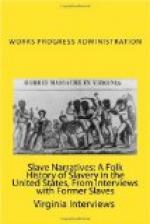“It all begun with our ship being took off the coast of Newport News, Virginia. We wuz runnin’ the blockade—sellin’ guns and what-not to them Northerners. We aint had nothin’ to do wid de war, unnerstand, we English folks was at’ter de money. Whose War? The North and South’s, of course. I hear my captain say many a time as how they was playin’ ball wid the poor niggers. One side says ’You can’t keep your niggers lessen you pay em and treat em like other folks.’ Mind you dat wasn’t de rale reason, they was mad at de South but it was one of de ways dey could be hurted—to free de niggers.”
“De South says ‘Dese is our niggers and we’ll do dum as we please,’ and so de rumpus got wuss dan it was afore. The North had all do money, and called itself de Gov’ment. The South aint had nothin’, but a termination not to be out-did, so we dealt wid de North. De South was called de Rebels.”
“So when dey see a ship off they coast, they hailed it and when we kep goin’, they fired at us. ’Twan’t long afore we was being unloaded and marched off to the lousiest jail I ever been in. My captain kep tellin’ em we was English subjects and could not be helt. Me, I was a scairt man, cause I was always free, and over here dey took it for granted dat all black men should be slaves.”
“The jailer felt of my muscles one day, when he had marched me out at the point of his musket to fill de watering troughs for de horses. He wanted to know who I blong ter, and offered to buy me. When nobody claimed me, they was forced to let me go long wid de other Britishers and as our ship had been destroyed, we had to git back home best we could. Dey didn’t dare hold us no longer.”
“As de war was still being fit, we was forced to separate, cause a lot of us would cause spicion, traipsing ’bout do country. Me—I took off southward and way from de war belt, traveling as far as Saint Augustine. It was a dangerous journey, as anybody was liable to pick me off for a runaway slave. I was forced to hide in de day time if I was near a settlement and travel at night. I met many runaway slaves. Some was trying to get North and fight for de freeing of they people; others was jes runnin’ way cause dey could. Many of dem didn’t had no idea where dey was goin’ and told of havin’ good marsters. But one and all dey had a good strong notion ter see what it was like to own your own body.”
“I felt worlds better when I reached Saint Augustine. Many ships landed there and I knowed I could get my way back at least to de West Indies, where I come frum. I showed my papers to everybody dat mounted ter anything and dey knowed I was a free nigger. I had plenty of money on me and I made a big ter do mong de other free men I met. One day I went to the slave market and watched em barter off po niggers lake dey was hogs. Whole families sold together and some was split—mother gone to one marster and father and children gone to others.”




